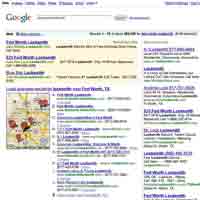- 04 Sep
Google Maps Still Spammed for Locksmiths
Two months ago, we discussed the abundance of spam listings in Google Maps for “locksmith” keywords. Indications at that time where that Google was attempting to crack down on these spammers, so I decided to take a look and see how they were coming along.
I looked at the listings for the six largest cities in Texas: Houston, Dallas, San Antonio, Austin, El Paso and Fort Worth. All have populations north of half a million people.
For each of these, I searched on the city name plus “locksmith”. So, for Houston, I searched on [houston locksmith]. For each Google Maps listing returned on the standard Google results page, I recorded:
- Display Name
- Display URL
- Phone Number
- Actual Name from Site Returned when the Listing is Clicked
- Actual URL from Site Returned when the Listing is Clicked
In addition, I recorded several subjective judgments for each listing and whether the site had duplicate listings within the same query.
All told, I looked at 53 listings. All the queries returned a 10-pack of map listings, except for Houston, which returned a 3-pack. Given Houston’s status as the largest city in Texas and the fourth largest in the United States, it was surprising that only a 3-pack was returned. Perhaps this is a clumsy attempt at spam reduction by Google.
Subjective Factor One
Is the listing for a local company?Many (most?) of the companies advertising in the locksmith industry do not employ any actual locksmiths. They are simply lead aggregators that collect your info and sell it to a locksmith in your area. Hopefully that locksmith sent out is licensed and trustworthy, but there is certainly no guarantee.
Unfortunately, only 35.85% of the listings surveyed actually reflected a local company. Nearly two out of three were clearly just pretending to be located in that geography.
Subjective Factor Two
Does the display name match the website name?I was relatively liberal on declaring a match. If the company had added a keyword, but the actual company name was recognizable, it counted as a match. In addition, a keyword-only name that used the same keyword name on the website counted as a match.
Only 60.47% of the time did the names match. This is something that Google clearly needs to address, but it will be difficult to do so in an automated manner. And Google hates to do things by hand.
If the listing did not link to a website, it was not counted in this metric.
Subjective Factor Three
Does the display URL match the website URL?One of the standard Google Maps spam tricks is to include a keyword URL in the display and have it redirect to your actual branded site. The hope is that the keyword URL would count as another instance of usage of the keyword.
Google does seem to be cracking down on this, as they matched 90.70% of the time. On the other hand, this should be very easy for Google to check. Simply have Googlebot crawl the link, and if there’s a redirect, shut them down. I’m not sure why Google is not taking a more aggressive stance on this obvious spam.
If the listing did not link to a website, it was not counted in this metric.
Subjective Factor Four
Is the listing name keyword spam?This was an assessment of how much the name of the listing on Google Maps appears to be just keyword usage. 47.17% of the listings had names that were nothing but keyword spam.
Again, this is hard to police in an automated manner, but the accuracy of a listing’s name is critical to the integrity of the system.
Subjective Factor Five
Is the listing spam?This was an assessment of whether the listing itself is spam. Over-usage of keywords and misrepresentation of location where the most common cause of a listing being judged as spam.
Unfortunately, 64.71% of the listings for “locksmith” in the six largest Texas cities are spam. In other words, barely a third of these listings can be trusted. This is an unacceptable quality level.
One company came up for both Austin and San Antonio. They appear to be a company licensed as a locksmith in Texas, although they are servicing multiple geographies. It’s not clear where they are actually located, however. I did not count them in the spam numbers as they are an unusual case.
Duplicate Listings
Six of the listings examined were duplicates within the same geography. In other words, the same company was taking up multiple listings within the same search. There was one match pair in Dallas and two matched pairs in Houston. This is another sort of spam that should be very easy for Google to detect.By city, here are the number of spam listings:
- Austin: 7 spam, 2 non-spam, 1 unclear
- Dallas: 7 spam, 3 non-spam
- El Paso: 1 spam, 9 non-spam
- Fort Worth: 9 spam, 1 non-spam
- Houston: 2 spam, 1 non-spam
- San Antonio: 7 spam, 2 non-spam, 1 unclear
For the keyword “locksmith”, at least, cattletown Fort Worth has the most can pork by-product in the state of Texas. And El Paso has the cleanest listings.
About the Author
December 22nd,2009,at 4:15pm[…] The locksmith industry has traditionally been one of the most spammy spaces on Google Maps. Google has been trying to crack down on this space for some time, but in September 2009, I performed an analysis that showed that the listings were still of extremely poor quality. […]


One Comment